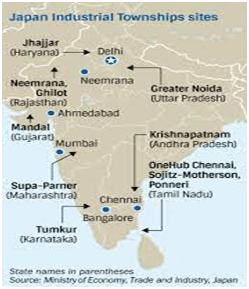Japan Industrial Townships
- Japan Industrial Townships are envisaged as Integrated Industrial park with ready-made operational platform, well equipped with world class infrastructure facilities, plug-in-play factories and investment incentives for Japanese companies.
- In Action Agenda for the India-Japan Investment and Trade Promotion and Asia-Pacific Economic Integration
- signed between Ms Nirmala Sitharaman, Hon’ble Minister of State for Ministry of Commerce & Industry, India and Mr Yoichi Miyazawa, Hon’ble Minister for Ministry of Economy, Trade and Industry, Japan on 30th April 2015 both the Ministers agreed to take steps to develop 11 potential sites as Japan Industrial Townships in India. Later, Pithampur Industrial Park, Madhya Pradesh was added to the list.
Existing Problems in Manufacturing Sector:
- The Cost of Acquiring a land and procedures are tedious.
- The Land Acquisition act is to be revised and cost of land is two high to buy in well connected areas which increases the cost of production of manufactured goods.
- Logistics is faced with severe traffic as Consignment takes very less time to reach from Kennedy International airport to Shivaji airport in Bombay Market.
- The Cost is logistics is much higher compared to developed Countries.

How can this industrial township Address the problems?
- As the FDI has doubled from Japan to India the money should be spent on infrastructure.
- The Labour conditions so far has been poor, the condition where a worker has to adjust and has to work with it.
- By Creating the industrial township it will provide a comfortable place for worker’s and his family in turn enhance production
Japanese companies across JITs
- Presently, there are 114 Japanese companies across JITs. Neemrana and Sri City industrial townships host most of the Japanese companies. Companies like Isuzu, Daikin, Yamaha Music, Kobelco, Hitachi Automotive etc. are marque Japanese investors, to set up manufacturing in these townships
- DPIIT and the States presented developed infrastructure and land readily available for Japanese investors in these townships.
- Japanese companies were invited for field visits to JITs, in order to attract investments.
- DPIIT reviewed the status of JITs with METI, in a virtual platform in light of COVID-19 pandemic.
- From Japanese side, Embassy of Japan in India and Japan External Trade Organization (JETRO) also participated.
- From Indian side, Officers from Ministry of External Affairs, Embassy of India in Tokyo and representatives of Invest India as well as representatives of State Governments took part in meeting.
Important:
- The Department for Promotion of Industry and Internal Trade (DPIIT) and Japan’s Ministry of Economy, Trade and Industry (METI) have jointly reviewed the progress made under the Japanese Industrial Townships (JITs) in India. Cureently, 114 Japanese companies are operating across the JITs. As the fifth largest investor, Japan has contributed over $36.2 billion in cumulative investments in India since 2000, especially in key sectors such as automobiles, electronics system design and manufacturing (ESDM), medical devices, consumer goods, textiles, food processing and chemicals.
- JITs were set up pursuant to the ‘action agenda for the India-Japan investment and trade promotion and Asia-Pacific economic integration’ signed between METI and DPIIT in April 2015 to take steps to develop ‘Japan Industrial Townships’ in India, especially in the Delhi-Mumbai Industrial Corridor (DMIC) and Chennai-Bengaluru Industrial Corridor (CBIC) regions in order to facilitate Japanese investment in India, the Ministry of Commerce and Industry said in a statement.
- Currently, there are 114 Japanese companies across the JITs. The Neemrana and Sri City industrial townships host the majority of the Japanese companies. Companies such as Daikin, Isuzu, Kobelco, Yamaha Music, Hitachi Automotive etc. are the marquee Japanese investors which have set up manufacturing in these townships. The Production Linked Incentive (PLI) scheme announced for 14 sectors received numerous applications.
- Japanese companies have also applied for these PLI schemes and have received approval. The National Single Window System, an initiative by the Central government, was also showcased to the Japan side. This one-stop digital platform currently has 20 Central ministries and 14 states/UTs onboard. DPIIT reviewed the status of JITs with METI through a virtual platform in view of the Covid-19 situation. The Embassy of Japan in India and Japan External Trade Organization (JETRO) also participated from the Japanese side. From the Indian side, officials from the Ministry of External Affairs, Indian Embassy in Tokyo and representatives of state governments and Invest India participated in the meeting.
Subscribe
0 Comments





